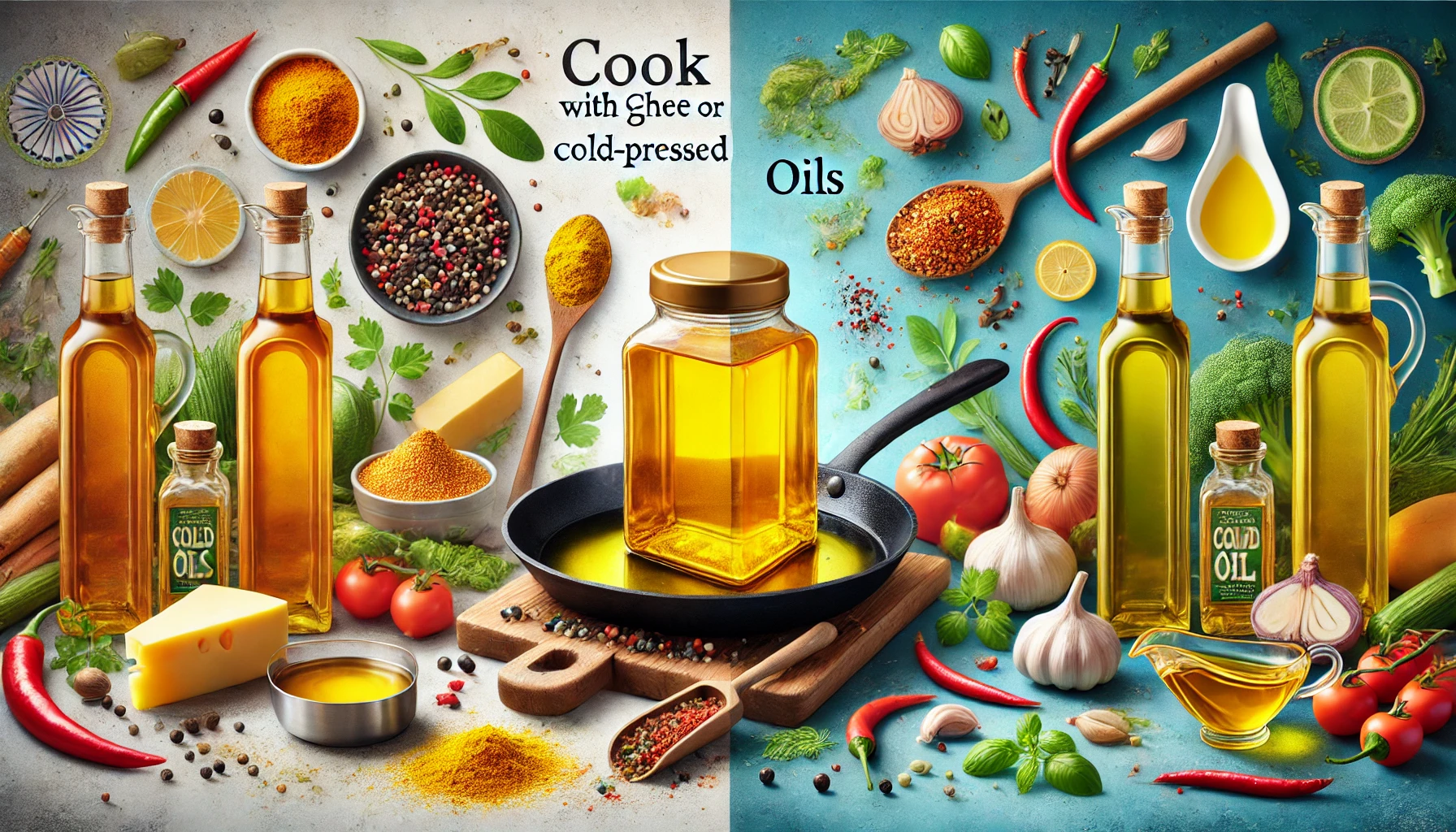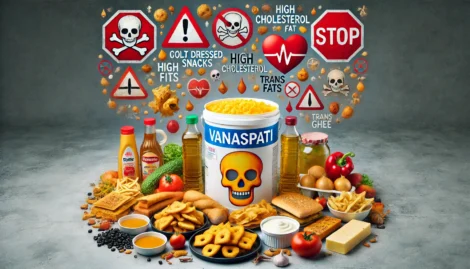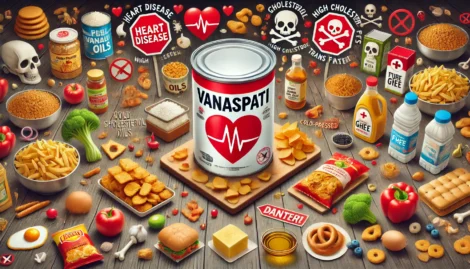- You have no items in your shopping cart
- Subtotal: ₹0.00

Is It Safe to Cook with Ghee and Cold-Pressed Oils? The Ultimate Guide to Frying with Healthy Fats
In today’s health-conscious world, cooking oils are no longer just a medium to prepare food. They’ve become an important part of our diets, with increasing focus on their nutritional value and impact on overall health. Among the many choices available, ghee and cold-pressed oils are often touted as healthier alternatives to the regular refined oils that dominate supermarket shelves. But which is better for cooking? And is it safe to use cold-pressed oils or ghee for frying and high-heat cooking?
In this blog post, we’ll dive deep into the science and debate around cooking with ghee and cold-pressed oils. We’ll explore their smoke points, nutritional benefits, and whether they are suitable for high-heat cooking. By the end, you’ll have a clear understanding of which fat to choose for your next meal, and why both ghee and cold-pressed oils can play an essential role in a healthy diet.
Understanding Ghee and Cold-Pressed Oils
Before we can compare these two fats for cooking, it’s important to understand what they are, how they are produced, and their unique properties.
What is Ghee?
Ghee is a type of clarified butter that has been used for thousands of years in traditional Indian cooking and Ayurvedic medicine. It is made by heating butter to separate the milk solids and water from the pure butterfat. The milk solids are removed, leaving behind a golden, rich liquid known as ghee.
Ghee has a high smoke point and is rich in fat-soluble vitamins such as vitamins A, E, and K. It also contains butyrate, a short-chain fatty acid that has anti-inflammatory properties and is known to support gut health.
What are Cold-Pressed Oils?
Cold-pressed oils, also known as wood-pressed or Marachekku oils, are extracted from seeds, nuts, or fruits using mechanical pressure without the use of heat or chemicals. This traditional method ensures that the oil retains its natural flavor, nutrients, and aroma. Cold-pressed oils are rich in antioxidants, vitamins, and healthy fats, making them a popular choice among health-conscious consumers.
Popular cold-pressed oils include:
- Cold-Pressed Coconut Oil
- Cold-Pressed Olive Oil
- Cold-Pressed Groundnut Oil
- Cold-Pressed Sesame Oil
Each cold-pressed oil has its own unique nutritional profile and smoke point, which determines whether it is suitable for high-heat cooking.
What is Smoke Point, and Why is It Important?
One of the most important factors to consider when choosing an oil or fat for cooking is its smoke point. The smoke point is the temperature at which the oil begins to smoke and break down, releasing harmful compounds and free radicals into the air and the food. When oils are heated beyond their smoke point, they lose their nutritional value and may even become toxic.
Smoke Points of Common Cooking Fats:
- Ghee: 450°F (232°C)
- Cold-Pressed Coconut Oil: 350°F (177°C)
- Cold-Pressed Olive Oil: 320°F (160°C)
- Cold-Pressed Groundnut Oil: 450°F (232°C)
- Cold-Pressed Sesame Oil: 350°F (177°C)
As you can see, ghee and cold-pressed groundnut oil have high smoke points, making them suitable for high-heat cooking methods such as frying, sautéing, and deep-frying. However, cold-pressed oils like olive and sesame have lower smoke points, which makes them better suited for low-heat cooking or as dressings and drizzles.
Is It Safe to Cook with Cold-Pressed Oils?
The debate over whether cold-pressed oils can be used for high-heat cooking has sparked much discussion among nutritionists, chefs, and health enthusiasts. While some argue that cold-pressed oils should never be used for frying due to their lower smoke points, others claim that they can be safely used in moderation, as long as the cooking temperature is carefully controlled.
Let’s take a closer look at the pros and cons of using cold-pressed oils for cooking.
Pros of Cooking with Cold-Pressed Oils:
- Nutrient Retention: Cold-pressed oils retain their natural vitamins, minerals, and antioxidants because they are not exposed to high heat during the extraction process. This makes them healthier and more nutritious compared to refined oils.
- Rich in Healthy Fats: Cold-pressed oils are often rich in monounsaturated and polyunsaturated fats, which are known to improve heart health and reduce inflammation. These healthy fats can be beneficial when consumed in moderation.
- Natural Flavor and Aroma: The natural flavors and aromas of cold-pressed oils can enhance the taste of dishes, especially when used in raw or low-heat applications like salad dressings or drizzling over cooked vegetables.
Cons of Cooking with Cold-Pressed Oils:
- Lower Smoke Points: Most cold-pressed oils have lower smoke points compared to refined oils and ghee. When heated beyond their smoke point, they lose their nutritional benefits and can release harmful free radicals.
- Not Suitable for Frying: Because of their lower smoke points, cold-pressed oils like olive and sesame should not be used for high-heat cooking methods like frying or sautéing. They are better suited for low-heat or no-heat applications.
- Shorter Shelf Life: Cold-pressed oils are more prone to oxidation and rancidity due to the lack of preservatives and heat treatment. They should be stored in a cool, dark place and used within a shorter time frame compared to refined oils.
When to Use Cold-Pressed Oils in Cooking
While cold-pressed oils may not be the best choice for deep frying or high-heat sautéing, they still play an important role in healthy cooking. Here are some tips on how to use cold-pressed oils in your kitchen:
- Low-Heat Cooking: Cold-pressed oils like olive oil and sesame oil are perfect for low-heat cooking methods such as light sautéing, stir-frying, and baking. Their delicate flavor enhances the dish without losing their nutritional value.
- Salad Dressings and Marinades: Cold-pressed oils add a rich, nutty flavor to salads, marinades, and dips. Try drizzling cold-pressed sesame oil or groundnut oil over a fresh salad for an extra burst of flavor and nutrition.
- Finishing Oils: Cold-pressed oils make excellent finishing oils for drizzling over cooked dishes. Whether it’s a bowl of pasta, grilled vegetables, or a slice of crusty bread, a drizzle of cold-pressed oil can elevate the taste and aroma of the dish.
- Raw Applications: For maximum nutritional benefit, use cold-pressed oils in their raw state. Add them to smoothies, oatmeal, or yogurt for a boost of healthy fats and antioxidants.
Why Ghee is a Better Choice for High-Heat Cooking
While cold-pressed oils are ideal for raw and low-heat applications, ghee stands out as one of the best fats for high-heat cooking. Here’s why:
1. High Smoke Point
Ghee has one of the highest smoke points of any cooking fat, at 450°F (232°C). This makes it an excellent choice for frying, sautéing, and roasting. Unlike oils with lower smoke points, ghee can withstand high temperatures without breaking down or releasing harmful compounds.
2. Rich in Healthy Fats
Ghee is packed with beneficial fats, including short-chain fatty acids like butyrate, which support gut health and reduce inflammation. It is also rich in omega-3 fatty acids, which are known to improve heart health and reduce the risk of chronic diseases.
3. Flavorful and Aromatic
Ghee has a rich, nutty flavor that enhances the taste of dishes without overpowering them. It adds a delicious depth of flavor to everything from curries to stir-fries, and it’s especially prized in Indian cuisine for its ability to enhance spices and herbs.
4. Lactose-Free
Since ghee is made by clarifying butter and removing the milk solids, it is free from lactose and casein, making it a suitable option for people with dairy sensitivities or lactose intolerance.
Ghee vs. Cold-Pressed Oils: Which Should You Choose?
Now that we’ve explored the pros and cons of ghee and cold-pressed oils, you may be wondering which one is the better choice for your cooking needs. The truth is, both ghee and cold-pressed oils have their place in a healthy diet, and the choice depends on the type of cooking you’re doing.
When to Choose Ghee:
- High-Heat Cooking: If you’re frying, sautéing, or roasting at high temperatures, ghee is the best choice due to its high smoke point and heat stability.
- Flavor Enhancement: Ghee’s rich, buttery flavor makes it a great addition to Indian dishes, curries, and any recipe that calls for deep, savory flavors.
- Lactose-Free Cooking: If you’re lactose-intolerant or sensitive to dairy, ghee is a safer option compared to butter.
When to Choose Cold-Pressed Oils:
- Low-Heat Cooking: Cold-pressed oils like olive, sesame, and coconut oil are best used for low-heat cooking, such as sautéing, stir-frying, or baking.
- Raw Applications: For salad dressings, marinades, and drizzling over cooked dishes, cold-pressed oils add a burst of flavor and nutrition.
- Heart Health: Cold-pressed oils are rich in monounsaturated and polyunsaturated fats, which can help lower cholesterol and improve heart health.
How GheeStore Can Help You Make the Right Choice
At GheeStore, we are committed to providing high-quality, nutrient-rich fats that enhance your cooking and support your health. Whether you’re looking for pure cow ghee with a high smoke point for frying, or cold-pressed oils for low-heat cooking, we have a wide range of products to suit your needs.
Our ghee is made using traditional methods to ensure the highest quality and purity, while our cold-pressed oils are extracted using wooden churners to retain their natural flavor and nutrients. By choosing GheeStore, you can enjoy the benefits of healthy fats without compromising on taste or quality.
Conclusion: Ghee and Cold-Pressed Oils Are Both Essential for Healthy Cooking
In the debate between ghee and cold-pressed oils, there is no clear winner. Both have their unique benefits and are suited to different types of cooking. For high-heat cooking, ghee is the best choice due to its high smoke point and heat stability. For low-heat cooking and raw applications, cold-pressed oils are the way to go, thanks to their nutrient retention and heart-healthy fats.
By incorporating both ghee and cold-pressed oils into your cooking, you can enjoy a wide range of flavors, textures, and health benefits. So the next time you’re in the kitchen, choose the right fat for the job, and don’t be afraid to experiment with new recipes and techniques.
Ready to upgrade your cooking? Explore the range of ghee and cold-pressed oils available at GheeStore and start cooking with healthy fats today!



